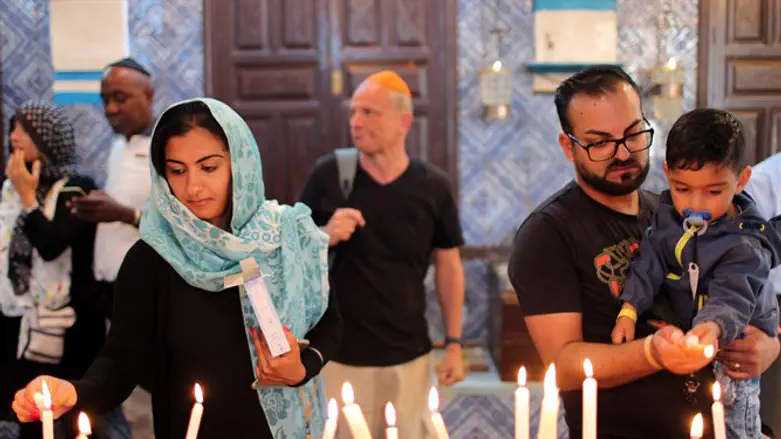
Worshippers lit candles and prayed on Wednesday at Africa's oldest synagogue in Tunisia to celebrate the Lag Ba'Omer holiday, marking a resurgence for the country's Jewish community after years of security woes.
Thousands of pilgrims converged on the Ghriba synagogue on the island of Djerba in southern Tunisia, an AFP photographer said, with thousands more expected to follow.
Alongside a heavy police and military presence, Tunisian worshippers were joined by numerous dignitaries from Israel and European countries to celebrate the annual festival.
"This is the first time I have come, it's a historic moment for me," Rabbi Moshe Sebbag of the Victory Synagogue in Paris told AFP.
French pilgrim Ketty Acco said she had come to Djerba at least 20 times, for holidays and for the Ghriba festivities.
"We're always very happy that tourism is growing again because before, there used to be 7,000 or 8,000 people and now we're happy because tourists are coming back," she said.
Tunisian Prime Minister Youssef Chahed also went to the synagogue, saying his visit sent "a message to say that Tunisia is a land of peace and tolerance".
"All religions have been welcome for 3,000 years, and this will continue," he said, adding that "Tunisia is a safe country, a country of tourism open to the world".
The number of Jews in Tunisia has fallen significantly, from around 100,000 before independence from France in 1956 to an estimated 1,500 today.
This year organizers expected between 5,000 and 6,000 pilgrims to visit the synagogue, around twice as many as in 2017.
In 2013, only 1,000 pilgrims visited the synagogue amid security concerns. In the past, thousands would flock to the synagogue for the annual Lag Ba’Omer pilgrimage.
The community is still recovering from a suicide bombing at the synagogue in 2002 that killed 21 people.
Before the attack, some 8,000 pilgrims used to travel to Djerba for the annual celebration. Around 3,000 had returned after the attack, prior to the revolution that toppled former strongman Zine El Abidine Ben Ali in January 2011.
The event was cancelled that year with the country on edge after the mass uprisings, but it resumed discreetly in 2012 and no incidents were reported.
Although the security situation in Tunisia has improved over the past two years, authorities continue to be wary and urge vigilance.
A state of emergency imposed after a series of attacks on tourists and security forces in 2015 remains in place, having been extended in March for another seven months.
Authorities are particularly wary of threats to tourist hotspots and voting installations for Sunday's municipal elections.
AFP contributed to this report.